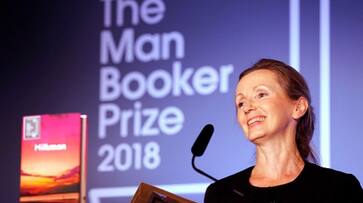Burns is the first writer from Northern Ireland to win the £50,000 prize, which is open to English-language authors from around the world
London: Anna Burns won the prestigious Man Booker Prize for fiction on Tuesday for “Milkman,” a vibrant, violent story about men, women, conflict, and power set during Northern Ireland’s years of Catholic-Protestant violence.
Burns is the first writer from Northern Ireland to win the £50,000 prize, which is open to English-language authors from around the world. She received her trophy from Camilla, Duchess of Cornwall, during a black-tie ceremony at London’s medieval Guildhall.
The 56-year-old Belfast-born novelist said she was “stunned” to have won. Burns said her books took a long time to complete, and she has often struggled financially since her first novel, “No Bones,” was released in 2001.
“I just wait for my characters to come and tell me their stories, and I can’t write until they do,” Burns told reporters. “Also, as with a lot of writers, they don’t earn much money. So that gets in the way of the creativity.”
Burns said that with her prize money, “I will clear my debts and live on what’s left.”
The writer said the germ of “Milkman” came to her in the image of a teenage girl walking down a street in a divided city while reading the novel “Ivanhoe.”
“Milkman” is narrated by a bookish young woman dealing with an older man who uses family ties, social pressure and political loyalties as weapons of sexual coercion and harassment. It is set in the 1970s but was published amid the global eruption of sexual misconduct allegations that sparked the “Me Too” movement.
“I think this novel will help people to think about ‘Me Too,’ and I like novels that help people think about current movements and challenges,” said philosopher Kwame Anthony Appiah, who chaired the judging panel. “But we think it’ll last — it’s not just about something that’s going on at this moment.
“I think it’s a very powerful novel about the damage and danger of rumour,” he added,
Burns beat five other novelists, including the bookies’ favourites: American writer Richard Powers’ tree-centric eco-epic “The Overstory” and Canadian novelist Esi Edugyan’s “Washington Black,” the story of a slave who escapes from a sugar plantation in a hot-air balloon.
The other finalists were US novelist Rachel Kushner’s “The Mars Room,” set in a women’s prison; Robin Robertson’s “The Long Take,” a verse novel about a traumatized D-Day veteran; and 27-year-old British author Daisy Johnson’s Greek tragedy-inspired family saga “Everything Under.”
Founded in 1969, the Man Booker Prize was originally open to British, Irish and Commonwealth writers. Americans have been eligible since 2014, and there have been two American winners — Paul Beatty’s “The Sellout” in 2016 and George Saunders’ “Lincoln in the Bardo” in 2017.
A third consecutive American victor would have revived fears among some UK writers and publishers that the prize is becoming too US-centric. But Appiah said neither the nationality nor the gender of the authors was a factor in the judges’ deliberations on the shortlist of four female authors and two men.
“If we had been drifting towards thinking that one of the men on the list was the best one, I wouldn’t have said ‘No guys, we’re going to get in trouble for this’ any more than if we’d been drifting towards an American,” he said. “We picked the one ... most deserving of the prize.”
The Man Booker has a reputation for transforming writers’ careers, and the one who will emerge from the field to beat other finalists is always subject to intense speculation and lively betting. Previous winners include Salman Rushdie, Ian McEwan, Arundhati Roy, and Hilary Mantel.
It’s likely to bring a big boost to Burns, who has published two previous novels but is hardly a household name.
“Milkman” appears on the printed page with few paragraph marks, which has led some to label it experimental and challenging. But Appiah said the vivid, distinctive Belfast language in Burns’ book was “really worth savoring.”
“If you’re having difficulty, try reading it out loud,” he said. “The pleasure of it really has to do with the way that it sounds. It’s challenging in the way a walk up (mount) Snowdon is challenging. It’s definitely worth it because the view is terrific when you get to the top.”
Last Updated Oct 17, 2018, 2:22 PM IST









![Salman Khan sets stage on fire for Anant Ambani, Radhika Merchant pre-wedding festivities [WATCH] ATG](https://static-gi.asianetnews.com/images/01hr1hh8y86gvb4kbqgnyhc0w0/whatsapp-image-2024-03-03-at-12-24-37-pm_100x60xt.jpg)
![Pregnant Deepika Padukone dances with Ranveer Singh at Anant Ambani, Radhika Merchant pre-wedding bash [WATCH] ATG](https://static-gi.asianetnews.com/images/01hr1ffyd3nzqzgm6ba0k87vr8/whatsapp-image-2024-03-03-at-11-45-35-am_100x60xt.jpg)


